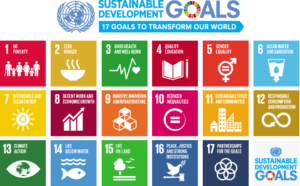
Symposium Co-Chairs
- Mei Lin Fung, Board Chair at People Centered Internet, co-founded with Vint Cerf; Chair of IEEE Technical Committee on Sustainability (SSIT)
- Tamara Singh, Board Member at People Centered Internet
- Ankit Kedia, Head of B2B Sales, Momentive.ai
- Anandi Iyer, Content Creator and entrepreneur
- Kamlesh Nagware, CTO at Snapper Future Tech, Hyperledger TSC Member & Hyperledger India Co-lead
Scope and Motivation
Blockchain is a technology of Trust, with trust, openness, and transparency built into its design. As the deadline for the United Nations’ 2015 call to action to end poverty, protect the planet, and ensure that by 2030 all people enjoy peace and prosperity draws closer, IEEE invites its community and stakeholders to consider how blockchain technologies can accelerate achievement of the UN Sustainable Development Goals (SDGs).

The UN’s 2021 Progress Report and helpful Progress Chart reflect that “the world was already off track in realizing the ambitions and fulfilling the commitments of the 2030 Agenda, even before COVID-19. As the pandemic continues to unfold, it is also magnifying deeply rooted problems: insufficient social protection, weak public health systems and inadequate health coverage, structural inequalities, environmental degradation and climate change”. Yet, as Einstein was quoted “In the midst of every crisis, lies great opportunity”, and adding the context of Blockchain reveals some of these:
- Data. The UN Progress report considers a limited number of indicators and on information available as of June 2021. For most of the indicators, the latest available data was from 2019 to 2020; for a few indicators, the data was from 2017. How might Blockchain enable the timely, efficient gathering of data?
- Literacy. As the science around sustainability matters develops, it is becoming increasingly hard for individuals and companies to understand their impact and what might be done to improve their impact. How might Blockchain enable individuals and companies to better understand their sustainability credentials?
It is also important to consider what nudges or changes may be necessary to render Blockchain a best-fit technology for Sustainable Development:
- Energy Consumption. In many forms, notably proof-of-work systems,, Blockchain technologies consume large amounts of energy. This may be prohibitively expensive for many, and may also fuel negative sustainability outcomes.
How might Blockchain be sustainable by default?
Blockchain could contribute to greater stakeholder involvement, transparency, and engagement, bringing trust and further innovative solutions in the fight against climate change, leading to more effective climate action. Blockchain technologies are likely to prove foundational in the build out and adoption of Web 3 and metaverse ecosystems. We invite the IEEE community to exchange their ideas and proposals for change.
Topics of Interest
We invite submissions in the form of presentations, panel discussions, demonstrations and research that considers topics similar to the below:
- Blockchain and Emerging Technologies in Pursuit of the SDGs
- Developing Sustainable Technologies
- Greening existing technologies
- Sustainable supply chain
- Circular economy
- Green Investment
- Regenerative Systems
- Technologies for the S and the G
- Digital Public Goods
- Climate Tech
- Sustainable finance
Submissions will be considered Where subjects are assessed to have the potential to further development of sustainable technologies and progress the sustainable development goals, these will be considered for keynote presentations or panel debate at the November 2022 symposium, or in an earlier workshop.

